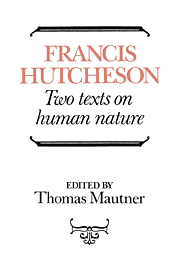Early reactions to Hutcheson
Published online by Cambridge University Press: 09 October 2009
Summary
Of the many early reactions, those to be presented below have been selected chiefly because they deal with Hutcheson's anti-egoist position. For reasons indicated in the preface, matters relating to his moral epistemology and ontology will be adverted to only in passing. Some of the information in the following survey may be new.
Orthodox theologians
The following statements by a historian of the Presbyterian Church in Ireland are very instructive:
Though the professor [i.e. Hutcheson] was a man of taste and genius, and though he deserves credit for checking that tendency to open licentiousness which characterised the philosophy of his age, his own spirit was decidedly anti-evangelical.
His scheme throughout is so complimentary to human nature, as almost to supersede the necessity of an atonement and a Saviour.
While the ethical system taught in Glasgow served to flatter the pride of human nature, it was also calculated to deceive men as to their state in the sight of God.
The candidates of the ministerial office could scarcely have been exposed to the influence of a more insinuating, and, at the same time, a more dangerous teacher.
Also, Hutcheson is said to have held ‘very incorrect views of the way of salvation’. Another writer made the same point as follows:
Though his theories were very beautiful, he taught a philosophy which sapped the foundations of evangelical religion, and which was the more dangerous because of the glitter which his beautiful speculations and eloquent Irish tongue threw around it. […]
- Type
- Chapter
- Information
- Hutcheson: Two Texts on Human Nature , pp. 65 - 84Publisher: Cambridge University PressPrint publication year: 1993



